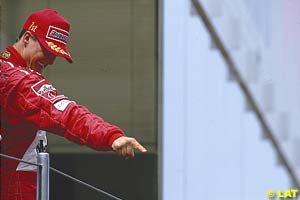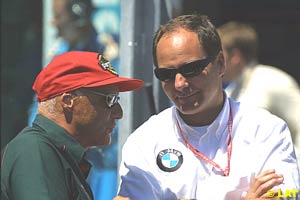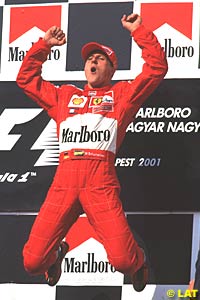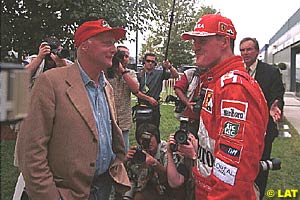
Atlas F1 Technical Writer
Exactly six years after he won for Ferrari for the first time, Michael Schumacher became, following the Spanish GP, the longest running driver at the Italian team. And what a run it has been! Schumacher is without a doubt the most successful Ferrari driver, and arguably enroute to become the most successful F1 driver ever, in every category imaginable. Will Gray talked to the German's predecessors at Ferrari, Gerhard Berger and Niki Lauda, and heard nothing but accolades. Welcome to the Schumacher Era
He could, then, continue his record-breaking career by overhauling Berger's former Ferrari teammate Nigel Mansell's record of nine wins in a season, set in a Williams a decade ago. It is looking increasingly likely. And Berger, now with Williams himself, as engine partner BMW motorsports boss, knows that his team, who are the World Champion's closest challengers, will have a tough time to fight back and take the title.
Austrian Berger has been around enough to pick the wheat from the chaff. He set his Ferrari longevity record in two stints with the team, between the years 1987 to 89 and 1993 to 95, but although he was successful in his first incarnation with the team, problematic politics left the team in disarray during his second term.
He has not only seen the great Champions, he has driven alongside the man who was arguably the greatest. As teammate to Ayrton Senna at McLaren in 1990, 1991 and 1992, he experienced the work of a genius. Comparing Senna with Schumacher Berger will, of course, not do, but he has admitted that Schumacher and Ferrari have taken things to another level.
"His performance is, as usual, outstanding," said Berger, now one of the top bosses in Ferrari's rival team Williams-BMW. "What he has done for Ferrari and for himself is outstanding and the statistics show how good he is. He won so many races and World Championships that it looks like he is going to be the most successful driver to have ever been in Formula One."
It is that success rate that has surely earned Schumacher his status as an 'honorary son' of the history-drenched Italian team. Schumacher has been offered 'a job for life' by top Ferrari boss Luca di Montezemolo and the long-serving German has already admitted he will drive for no other team for the rest of his career.
And that is why the German World Champion has managed to become arguably the most recognisable icon Ferrari have ever had. Before Schumacher joined the team, in 1996, the word 'Ferrari' would stir the mind into recollections of the emotive but almost careless character of Canadian Gilles Villeneuve and his legendary number 27.
Now, mention the scarlet scuderia in 2002, and the mind turns to the precision performances and controlled persona that is Michael Schumacher, as well as the associated number one that has adorned his car for the last couple of years.
Villeneuve's was, of course, a golden era. But in a new age of ultimate professionalism it is results that count and Berger believes that Schumacher's performances, which have seen Ferrari rise to the top and take three Constructors' Championship victories and two World Championships in succession, are second to none.
"Villeneuve was a completely different character, he was very spectacular whereas Michael is only sometimes spectacular," said Berger. "But Michael is just outstanding from the overall performance and one thing is sure that the dominating factor in Ferrari is not anymore the number 27, it is Michael Schumacher and the number one."
Schumacher hardly shows the emotive passion that Villeneuve possessed, his podium star jumps often the only chink in a constant armour of concentration. But add names such as Niki Lauda, Jean Alesi, Eddie Irvine, and so on to the list of long-serving drivers at Ferrari then still Schumacher's record is virtually in a league of its own.
Schumacher has won more than one third of the races he has entered with the Italian team - 39.2 percent, in fact, after his latest win in Barcelona. Niki Lauda, who is now the boss of Jaguar Racing, is his closest challenger, having won 28.3 percent of his races at Ferrari. Only 1950s legend Alberto Ascari, who won almost half the races he entered, has achieved better.
Not that Ascari's superior rate matters to Lauda, who won two World Championships for Ferrari and is second on their all-time winners list. Whatever the figures say, Schumacher's era at the Italian team, the Austrian says, is the best ever because he has clocked up the most wins. So can Schumacher now be bracketed a Ferrari legend?
"Absolutely," Lauda responds. "It is a perfect combination and it works so well that it could even last for centuries. He has the highest wins. Nobody could do more. If you look at the results then for sure, he is the best they have ever had."
And the records are sure to keep tumbling. Not for centuries, as Lauda claims, but quite probably for some years to come, because Schumacher is contracted with the team until the end of 2004 and it looks like there will be quite some time before his rivals catch him up.
Berger has already conceded the drivers' world title this year to Schumacher after just five of the 17 races. The German driver's dominance looks unbeatable and Berger believes that is because the new Ferrari is one of the best cars the team has ever produced.
"The new Ferrari is a very strong car," conceded Berger. "Last year's was very competitive and there was no reason that this year's was going to be better. It is, and it has improved a lot so we all have a big challenge to catch them. A very tough challenge."
But despite his impressive current form, Schumacher remains cautious about his approach to the season and is not going to lay claim on his fifth Championship victory until the results show he cannot be beaten. His comment that he could be competitive on every circuit may point towards a certain confidence, but he knows that to be cocky is to throw it all away.
That said, the form guide shows Schumacher's success will continue to run and run. Retirement is certainly not on the current agenda - not until he has notched up more than nine wins in a season and added the other remaining records that are up for grabs in the book, that is for sure.
Schumacher is still behind Senna on all-time pole positions, by some way, and he must win two more Championships to overhaul the five titles won by Argentine driver Juan Manuel Fangio during the 1950s. Still, even now there is no doubt that Schumacher has reached legendary status, not only in Ferrari eyes past and present but also in the eyes of Formula One as a whole.
* Schumacher's count of 97 GP starts include the 1999 British Grand Prix, where the German broke his leg on the opening lap of the first start but did not take the second start of the race. Additional Grand Prix that Schumacher participated in but did not start was the 1996 French Grand Prix. In that instance, the Ferrari driver blew up an engine on the formation lap of that race, and therefore did not take the start.
World Champion Michael Schumacher became the longest serving driver with the legendary Ferrari team at last weekend's Spanish Grand Prix, when he made his 98th appearance in the scarlet overalls, and 97th Grand Prix start (see footnote). It is now more than six years since he first became bedecked in Ferrari red and his predecessors are now hailing him as the team's greatest ever driver.
 At the Circuit de Catalunya, with another polished performance which is now becoming the norm, German Schumacher overhauled Austrian Gerhard Berger's previous Ferrari race record with yet another victory. It was his fourth of the year and he has now admitted that, for the rest of the year, he does not think there is a track on which he will not be competitive.
At the Circuit de Catalunya, with another polished performance which is now becoming the norm, German Schumacher overhauled Austrian Gerhard Berger's previous Ferrari race record with yet another victory. It was his fourth of the year and he has now admitted that, for the rest of the year, he does not think there is a track on which he will not be competitive.
 We are, therefore, clearly now in a Schumacher era. Despite having Rubens Barrichello, one of the most talented drivers on the grid, as their second driver, Ferrari may just as well be a one-car team. Schumacher has worked them around him in such a way that both he and his top engineers are part of the Ferrari wallpaper, an indispensable part at that.
We are, therefore, clearly now in a Schumacher era. Despite having Rubens Barrichello, one of the most talented drivers on the grid, as their second driver, Ferrari may just as well be a one-car team. Schumacher has worked them around him in such a way that both he and his top engineers are part of the Ferrari wallpaper, an indispensable part at that.
 He has not only raced in the most Grands Prix for Ferrari, but he has clocked up the most wins for the team during his long reign. Of the modern era, Schumacher is also well ahead of his Ferrari predecessors when it comes to best success rate.
He has not only raced in the most Grands Prix for Ferrari, but he has clocked up the most wins for the team during his long reign. Of the modern era, Schumacher is also well ahead of his Ferrari predecessors when it comes to best success rate.
 "I have enough experience of motor racing to know that you can have a good situation for a certain time and then it can change," he has said recently. "It has happened before and there is no reason it will not happen again. You can never rest and feel too comfortable."
"I have enough experience of motor racing to know that you can have a good situation for a certain time and then it can change," he has said recently. "It has happened before and there is no reason it will not happen again. You can never rest and feel too comfortable."
Ferrari drivers' record while driving for the team:
Driver Seasons Starts Wins Rate
M.Schumacher In 7th 97 38 39.2%
G.Berger 6 96 5 5.2%
M.Alboreto 5 80 3 3.7%
J.Alesi 5 79 1 1.2%
C.Regazzoni 6 73 4 5.5%
G.Villeneuve 6 66 6 9.0%
E.Irvine 4 65 4 6.1%
N.Lauda 4 57 15 26.3%
J.Ickx 5 55 6 10.9%
R.Barrichello 3 38 1 2.6%
A.Ascari 5 27 13 48.1%
Please Contact Us for permission to republish this or any other material from Atlas F1.
|
Volume 8, Issue 18
Atlas F1 Exclusive
Interview with Eddie Jordan
Ann Bradshaw: View from the Paddock
Schumacher's Reign Supreme at Ferrari
Atlas F1 Special
Rob Walker: The Greatest Privateer
Spanish GP Review
Spanish GP Review
Spanish GP - Technical Review
Steering Lock
Hope Springs Eternal
Stats & Data
Qualifying Differentials
SuperStats
Charts Center
Columns
Season Strokes
Elsewhere in Racing
The Grapevine
> Homepage |